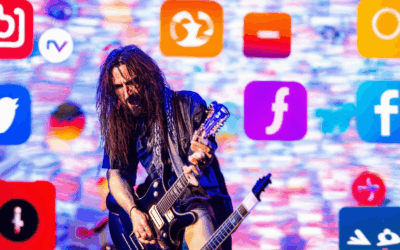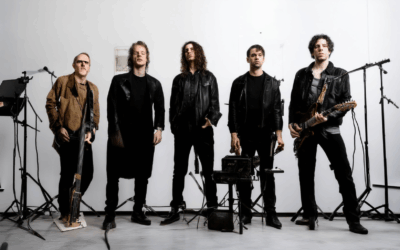In the dynamic world of music, connections mean everything. For bands aiming to thrive in the competitive landscape of the music industry, effective networking is not just an advantage—it’s a necessity. Whether it’s collaborating with fellow musicians, securing gig opportunities, or building a loyal fanbase, networking plays a pivotal role in shaping a band’s trajectory. However, navigating the complexities of music industry networking can feel overwhelming, especially when faced with the challenges of standing out in a crowded scene. This guide delves into proven strategies, tools, and insights designed to help bands build lasting connections and advance their careers. From leveraging platforms like Vampr and Reddit to mastering the art of social media engagement, we’ll explore how to network like a pro and unlock new opportunities in the music world.
Key Takeaways
– Leverage the Right Social Media Platforms: Choose platforms like Instagram, Twitter, YouTube, TikTok, SoundCloud, Spotify, Apple Music, Deezer, Bandcamp, Reddit, or Discord to align with your goals, audience, and content type.
– Adjust Posting Frequency: Tailor your posting schedule based on your fanbase size, platform, and content type—ranging from 1-2 posts per week for smaller audiences to 5-6 posts weekly for larger ones.
– Maximize Facebook’s Potential: Utilize Facebook for its vast reach, targeted advertising, fan engagement, and community-building features to promote your music and connect with fans.
– Build a Strong Online Presence: Focus on creating a compelling digital presence across platforms to foster long-term connections and grow your audience effectively.

How to Network as a Band
To effectively network as a band, consider the following organized approach:
- Attend Local Shows : Participate in live events to connect with fellow musicians and industry professionals. This provides opportunities for collaboration and exposure.
- Develop a Strong Online Presence : Create a professional website and utilize social media platforms like Instagram, Twitter, and Facebook to share your music and updates, attracting new followers and potential collaborators.
- Engage Through Guest Blogging : Write articles or interviews about music to interact with other artists and expand your network.
- Seek Collaboration Opportunities : Collaborate with other bands through guest spots on podcasts or mixtapes, and explore joint projects for mutual benefits.
- Build Relationships with Venues and Promoters : Establish contacts in the venue and promoter scene to secure performance slots and gain visibility.
- Leverage Festivals and Events : Submit your music to festivals and events to showcase your talent and network with performers and industry figures.
- Reach Out to Press and Media : Distribute press kits and share your music with bloggers and journalists to gain exposure and build influential connections.
- Utilize Music Platforms Effectively : Use platforms like Spotify and Apple Music to connect with global listeners and engage with fans through comments and messages to foster a loyal community.
By systematically implementing these strategies, you can build a robust network that supports your band’s growth and success in the music industry.
How to Be Really Good at Networking
Networking is a vital skill for building relationships, advancing your career, and discovering opportunities. To excel in this area, here’s a step-by-step guide tailored for those looking to master the art of networking:
1. Prepare Thoroughly
Before attending any event, take the time to:- Research the Attendees : Familiarize yourself with who will be there to understand common ground.- Dress Appropriately : Make a good first impression by wearing professional attire suitable for the event.- Prepare Talking Points : Have key points ready to share about yourself, your work, and interests.
2. Engage Actively
During interactions, focus on:- Active Listening : Show genuine interest in others by maintaining eye contact and nodding.- Ask Open-Ended Questions : This encourages deeper conversations and reveals shared interests.- Share Meaningfully : Talk about your passions, challenges, and goals to foster connection.
3. Follow Up Thoughtfully
After meeting someone:- Exchange Contact Information : Collect business cards and save details in your contacts.- Schedule Follow-Ups : Propose a time to connect further via email or phone.- Stay Connected Online : Keep in touch on LinkedIn or social media platforms.
4. Be Yourself
Authenticity is key to forming genuine connections. Don’t pretend to be someone you’re not:- Be Confident : Present yourself clearly and assertively.- Show Humor : Lighten the mood with appropriate jokes or anecdotes.- Be Honest : Share your story and aspirations truthfully.
5. Learn and Grow
Continuous improvement is essential:- Read Books : Look into titles like “How to Win Friends and Influence People” for insights.- Take Courses : Consider online classes or workshops on networking and communication.- Practice Regularly : Network in various settings to build versatility.
By following these steps, you can become a proficient networker, turning casual encounters into meaningful relationships and opportunities. Remember, the goal is to connect authentically and meaningfully. Learn more about effective networking tips .

How to Make Your Band Successful
To make your band successful, focus on these key strategies:
- Develop a Unique Sound : Craft a distinct musical style that sets you apart. Identify gaps in the market and tailor your sound to appeal to a specific audience.
- Build a Strong Lineup : Assemble talented, committed musicians who share your vision. A great lead vocalist and solid instrumentation are foundational to your success.
- Create a Memorable Image : Consistently brand your band with a unique logo, color scheme, and social media presence. A professional website is essential for showcasing your work.
- Network Aggressively : Attend local events, submit your music to blogs, and engage with fans on social media. Collaborate with other bands and promoters to expand your reach.
- Invest in Quality Recording : Use high-quality recording techniques to produce polished tracks that reflect your artistic identity.
- Focus on Live Performances : Deliver energetic, memorable performances that create a unique experience for your audience.
- Leverage Social Media and Promotion : Utilize platforms like Instagram, TikTok, and YouTube to share your music and connect with fans. Collaborate with influencers and pitch your story to press.
- Build Relationships with Other Bands and Promoters : Support other acts and seek collaborations to gain exposure and opportunities.
- Diversify Income Streams : Sell merchandise, tickets, and explore crowdfunding options to sustain your project.
- Stay Persistent and Adaptable : Embrace change and remain open to feedback to evolve with the music scene.
By prioritizing these steps, you can build a sustainable and thriving career in music.

Best Social Media Platforms for Bands
Choosing the best social media platform for bands depends on their goals, audience, and type of content. Here’s an overview of the most popular platforms and their benefits:
- Facebook : Ideal for building a broad fan base and sharing updates. Bands can create fan pages to connect with followers and promote events.
- Instagram : Great for visual content, including photos, videos, and behind-the-scenes glimpses. It’s perfect for showcasing a band’s aesthetic and lifestyle.
- Twitter : Excellent for real-time engagement and quick updates. Bands can share news, tour dates, and interact with fans in trending conversations.
- YouTube : Best for video content, including official music videos, live performances, and behind-the-scenes documentaries. It helps build a visual identity.
- TikTok : Popular among younger audiences, TikTok allows bands to create short, catchy videos that can go viral and reach a wider audience.
- SoundCloud : Perfect for streaming music and building a community around new releases. It’s a hub for discovering emerging artists and sharing music.
- Spotify : A crucial platform for distributing music and increasing visibility. It helps listeners discover new bands and explore playlists.
- Apple Music : Known for high-quality audio streaming, Apple Music offers curated playlists and user-generated content, ideal for serious music enthusiasts.
- Deezer : Similar to Apple Music, Deezer provides a premium listening experience with features like user-generated playlists.
- Bandcamp : Great for selling music directly and managing a discography. It’s essential for bands looking to monetize their work and connect with fans.
- Reddit : Home to niche communities, bands can participate in discussions and share content within specific subreddits to engage with passionate fans.
- Discord : Useful for building a dedicated community, hosting chats, and organizing events. It fosters loyalty among fans and provides a space for direct interaction.
The best platform for a band ultimately depends on their priorities, whether it’s visual content, direct music sharing, community building, or monetization.
How Often Should a Band Post on Social Media?
The frequency of social media posts for a band depends on several factors, including the size of the fanbase, the platform, and the content type.
- Platforms with Larger Audiences: Bands with significant followings on platforms like Instagram, Facebook, and Twitter should aim for 3-5 posts per week. These platforms require consistent engagement to maintain visibility.
- Smaller Fanbases: For bands with fewer than 5,000 followers across platforms, 1-2 posts per week are usually sufficient. This ensures content stays fresh without overwhelming the audience.
- Content Type: Visual platforms like Instagram and TikTok may require more frequent posts (5-6 times weekly), while text-based platforms like Twitter can manage with 2-3 posts per week.
- Seasonality: Increase posting frequency during events, tours, or new releases. Decrease activity during slower periods like holidays or breaks.
- Engagement Matters: Consistently engage with fans by responding to comments and messages, even if posts are less frequent.
Example Schedule:
– Instagram: 5-6 posts/week
– Facebook: 3-4 posts/week
– Twitter: 2-3 posts/week
– TikTok: 5-6 posts/week
– YouTube: 2-3 videos/month
To manage posting schedules effectively, consider using tools like Buffer, Hootsuite, or Later. These platforms help plan and schedule posts in advance, ensuring consistency without overwhelming your audience.

Do Bands Still Use Facebook?
Bands continue to use Facebook extensively, despite the rise of other social media platforms. Facebook remains a valuable tool for musical acts due to its broad reach, robust advertising capabilities, and strong community-building features.
Facebook’s Reach
- Facebook boasts over 2 billion active users, making it one of the largest social networks globally.
- Bands can connect with fans worldwide, fostering global engagement and fanbases.
- Facebook allows for targeted advertising, helping bands reach specific demographics and locations.
Why Bands Still Use Facebook Today
- Fan Engagement : Facebook enables direct interaction through likes, comments, and shares, allowing bands to engage with fans in real-time.
- Content Sharing : Bands can easily share videos, tour updates, and new music directly on Facebook, reaching their audience quickly.
- Community Building : Facebook groups and pages help bands build loyal fan communities, fostering a sense of belonging among supporters.
Advantages Over Other Platforms
- While platforms like Instagram and TikTok dominate music promotion, Facebook offers unique benefits:
- Backlink Opportunities : Facebook allows bands to link to their official website, boosting SEO and driving traffic.
- Integrated Marketing : Facebook’s ad platform supports comprehensive marketing campaigns, including lookalike audiences and retargeting ads.
- Long-Term Engagement : Facebook users tend to have longer attention spans compared to newer platforms, leading to more sustained engagement.
Conclusion
Facebook remains an essential tool for bands looking to promote their music, connect with fans, and build a sustainable career in the music industry. Its combination of reach, targeting capabilities, and community features makes it a cornerstone of any band’s digital strategy.



0 Comments